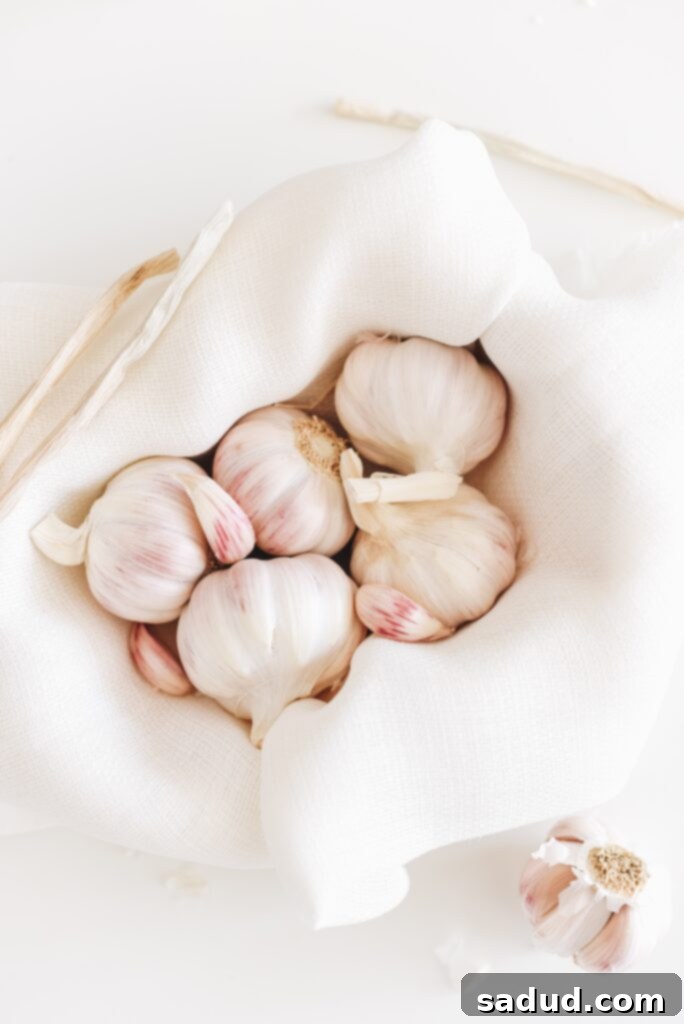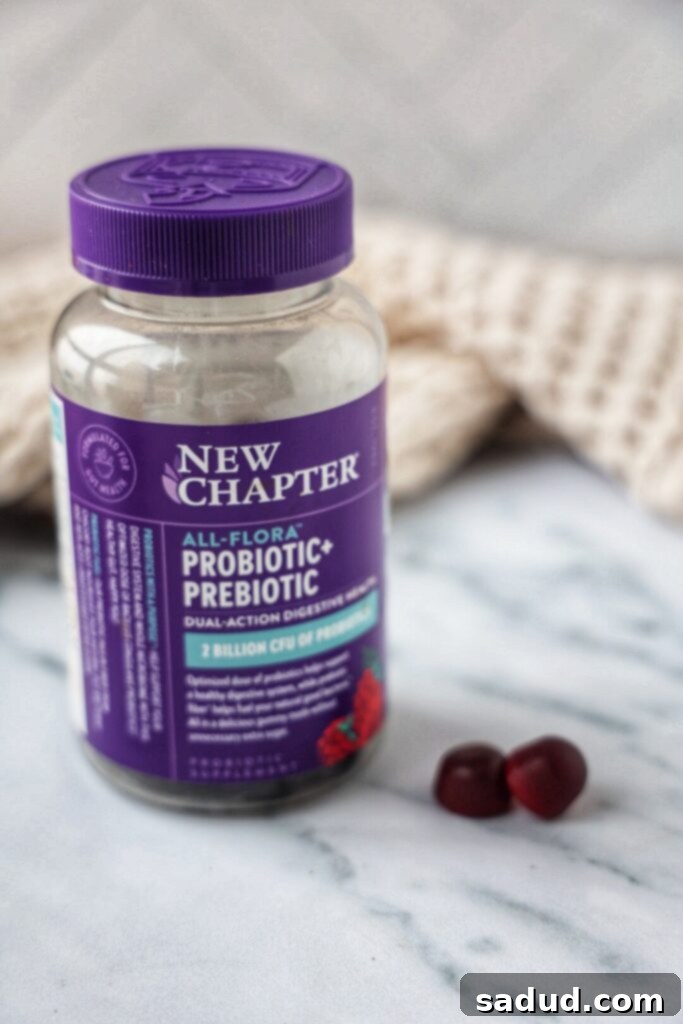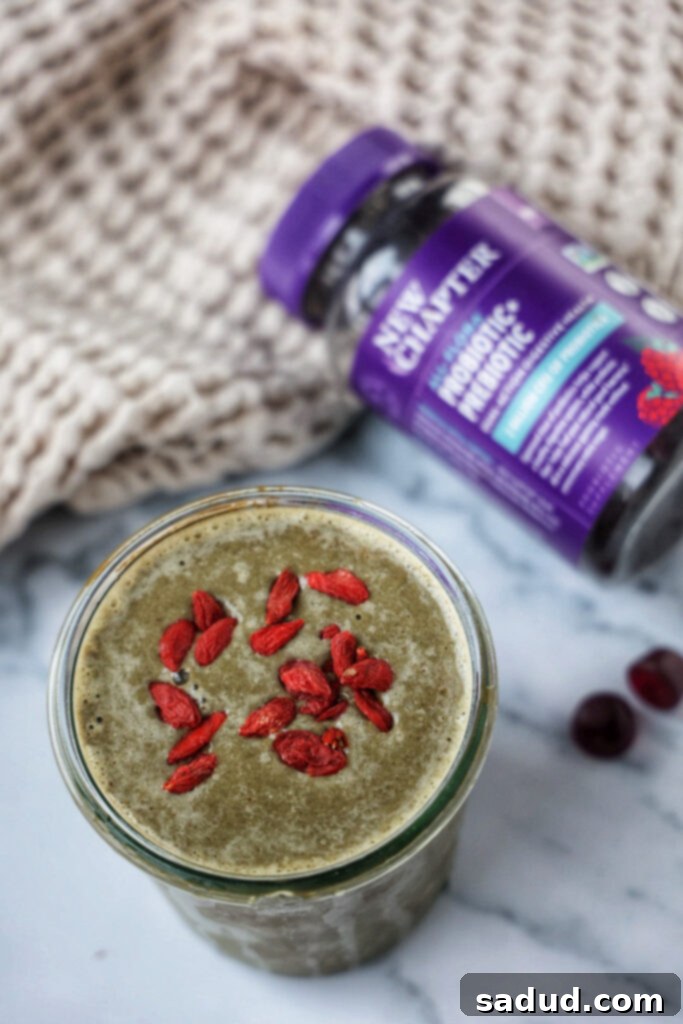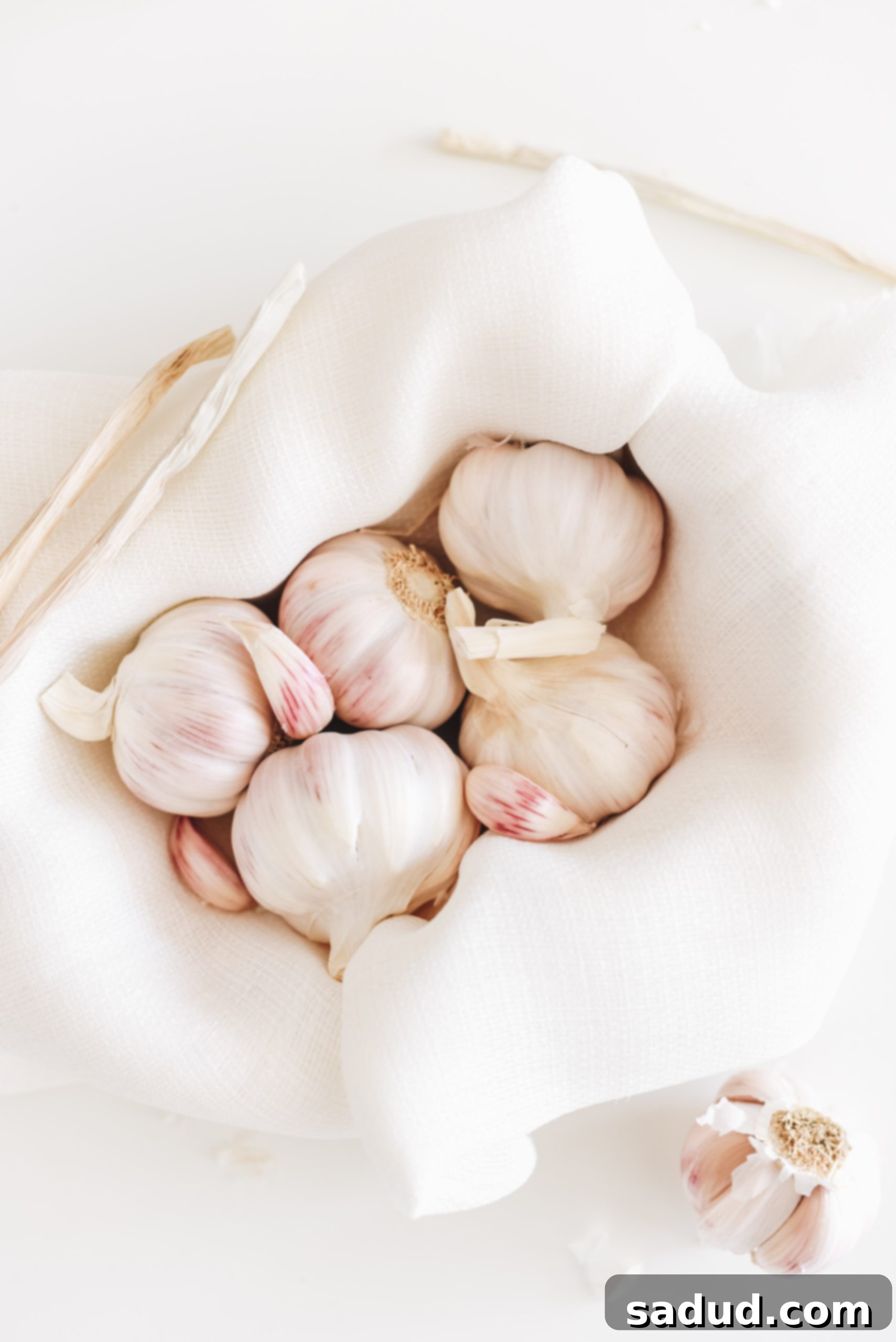Unlock Optimal Gut Health: The Essential Guide to Probiotics, Prebiotics, and New Chapter Gummies
In the bustling world of health and wellness, probiotics often take center stage, celebrated for their role in gut health. However, there’s another crucial player in the game that deserves equal attention: prebiotics. While probiotics are the “good” bacteria your body needs, prebiotics are the vital “food” that helps these beneficial microbes thrive. Understanding the intricate relationship between the two is paramount for anyone looking to achieve optimal digestive well-being, bolster their immune system, and even improve their mood.
This comprehensive guide will delve deep into the distinct roles of probiotics and prebiotics, explore their profound benefits for your overall health, and provide actionable insights on how to seamlessly integrate them into your daily diet. Furthermore, we’ll take an in-depth look at a convenient and effective solution for ensuring you get both: the New Chapter All-Flora Probiotic + Prebiotic Gummies, a delicious and easy way to support your gut health journey.

Probiotics vs. Prebiotics: Understanding the Core Differences for a Healthy Microbiome
To truly harness the power of a healthy gut, it’s essential to first differentiate between probiotics and prebiotics. While often discussed together, they play distinct yet complementary roles in maintaining your internal ecosystem.
Probiotics: The Live Benefactors
Probiotics are living microorganisms, often referred to as “good” or “friendly” bacteria, that, when consumed in adequate amounts, confer a health benefit to the host. They are either identical or very similar to the microbes naturally found in your gut. Their primary role is to maintain or improve the balance of the gut microbiota, which is the complex community of microorganisms residing in your digestive tract. A balanced microbiota is fundamental for a myriad of bodily functions, playing a major role in a healthy digestive system, robust immune function, and even mental well-being. Probiotics work by colonizing the gut, crowding out harmful bacteria, producing beneficial compounds (like short-chain fatty acids), and interacting with the immune system. You can find probiotics naturally in fermented foods such as:
- Yogurt (especially varieties with live and active cultures)
- Sauerkraut (unpasteurized)
- Kimchi
- Kefir (fermented milk drink)
- Tempeh (fermented soybean product)
- Miso (fermented soybean paste)
- Pickles (salted gherkin pickles, naturally fermented)
- Apple cider vinegar (raw, unfiltered with “the mother”)
Prebiotics: The Nourishment for Your Good Bacteria
In contrast, prebiotics are non-digestible fiber compounds that pass through your upper digestive tract without being broken down. This resilience allows them to reach the colon intact, where they are then selectively fermented by beneficial gut microflora, primarily probiotics. Essentially, prebiotics act as a specialized food source, fueling the growth and activity of the “good” bacteria already present in your gut. Think of them as the fertilizer for your internal garden, helping your beneficial microbes flourish. Without adequate prebiotics, even the most robust probiotic supplements or foods might not have the sustained impact they could. Common sources of prebiotics include:
- Green, under-ripe bananas
- Raw garlic
- Leeks
- Asparagus
- Dandelion greens
- Onion
- Whole oats
- Apples
- Chicory root
- Jerusalem artichokes
It is important to note that if you don’t currently consume a healthy amount of prebiotic-rich foods and want to increase them, start slowly. Adding too many all at once can cause digestive discomfort like gas, bloating, and cramps, as your gut microbiota adjusts to the increased fiber intake. Gradual introduction allows your system to adapt smoothly.
The Amazing Benefits of Probiotics for Your Health
The health benefits associated with a thriving population of probiotics in your gut are far-reaching and impact nearly every system in your body. Here are some of the most significant advantages:
-
Improves Digestive & Gut Health: This is arguably the most well-known benefit. Probiotics help restore balance to the gut microbiome, especially after disruptions from antibiotics, illness, or poor diet. They can alleviate common digestive issues like constipation, diarrhea (including antibiotic-associated diarrhea), and symptoms of irritable bowel syndrome (IBS) by producing short-chain fatty acids, strengthening the gut barrier, and modulating gut motility.
-
Can Improve Skin Health: The “gut-skin axis” is a fascinating area of research. An imbalanced gut can contribute to inflammatory skin conditions like acne, eczema, and rosacea. Probiotics can help reduce systemic inflammation, improve gut barrier function (reducing the leakage of toxins into the bloodstream), and modulate the immune response, all of which can lead to clearer, healthier skin.
-
Supports Mental Health & Mood: Often referred to as the “second brain,” the gut communicates extensively with the brain via the gut-brain axis. Probiotics can influence the production of neurotransmitters like serotonin (a large percentage of which is produced in the gut), reduce stress hormones, and decrease inflammation that can impact brain function. This connection means a healthy gut can contribute to improved mood, reduced anxiety, and even better cognitive function.
-
Can Boost Immune System Function: A remarkable 70-80% of your immune system resides in your gut. Probiotics play a crucial role in training and supporting this immune response. They can help the body recognize and fight off pathogens, produce antimicrobial compounds, and strengthen the gut lining to prevent harmful substances from entering the bloodstream, thereby reducing the frequency and severity of infections.
Why Prebiotics Are Crucial: Unleashing Their Health Benefits
While probiotics get much of the spotlight, prebiotics are the unsung heroes that create the ideal environment for these beneficial bacteria to flourish. Their unique properties contribute to a wide array of health improvements:
-
Regulates Hormone Levels: Emerging research suggests a strong link between gut health and hormonal balance. Prebiotics can influence the production and metabolism of various hormones, including estrogen. A healthy gut microbiome, fueled by prebiotics, can help to properly excrete excess hormones, preventing reabsorption and contributing to more stable hormonal levels, which can be particularly beneficial for women’s health.
-
Can Improve Mood: Just like probiotics, prebiotics indirectly support mental well-being by fostering a healthy gut environment. By feeding beneficial bacteria, prebiotics help these microbes produce compounds that can positively influence neurotransmitter production and reduce inflammation, both of which are critical for mood regulation and can alleviate symptoms of depression and anxiety.
-
Improves Digestion & Gut Health: Prebiotics are a type of dietary fiber, and their fermentation in the colon produces short-chain fatty acids (SCFAs) like butyrate, acetate, and propionate. These SCFAs are vital for the health of colon cells, provide energy, and help maintain the integrity of the gut lining. This process can significantly improve bowel regularity, relieve constipation, and enhance overall digestive efficiency.
-
Can Reduce Inflammation: Chronic inflammation is at the root of many modern diseases. Prebiotics contribute to reducing inflammation by promoting the growth of anti-inflammatory bacteria and the production of SCFAs, particularly butyrate, which has potent anti-inflammatory effects throughout the body. A well-nourished gut microbiome can help to calm systemic inflammation, benefiting conditions from autoimmune disorders to metabolic syndrome.
-
Helps Boost Immune Function: By feeding the beneficial bacteria that train and interact with the immune system, prebiotics indirectly strengthen your body’s defenses. A robust and diverse gut microbiota, supported by prebiotics, is better equipped to prevent the colonization of harmful pathogens and can enhance the overall immune response, making you more resilient to illness.

The Synergistic Power of Both: Why Probiotics and Prebiotics Belong Together
While both probiotics and prebiotics offer impressive individual benefits, their true power lies in their synergy. They work together in a harmonious relationship, often referred to as synbiotics, to create an optimal environment for your gut health. Think of it like this: probiotics are the diligent workers in your gut’s garden, performing essential tasks like digestion, nutrient absorption, and immune modulation. However, these workers need sustenance to thrive and be effective. This is where prebiotics come in – they provide the “food” or “fuel” that enables probiotics to multiply, colonize, and carry out their beneficial functions efficiently.
Without adequate prebiotics, probiotic supplements or foods might struggle to establish themselves or maintain their population size within the gut. Conversely, consuming prebiotics without a healthy existing population of probiotics might not yield the same extensive benefits, as there would be fewer “workers” to consume the “food.” When consumed together, they create a powerful feedback loop: prebiotics feed the probiotics, which then grow and produce more beneficial compounds, further enhancing gut health and overall well-being. This combined approach ensures a diverse, balanced, and resilient gut microbiome, which is the cornerstone of optimal health.
Introducing New Chapter All-Flora Probiotic + Prebiotic Gummies: Your Convenient Solution
While prioritizing a diet rich in probiotic and prebiotic foods is always the ideal foundation for gut health, the realities of modern life often make consistent intake a challenge. Our busy schedules, frequent travel, and the desire for convenience can sometimes lead to gaps in our nutritional intake. This is precisely why having a reliable, high-quality supplement can serve as invaluable “insurance” to ensure you’re consistently supporting your gut health and covering your nutritional bases.

This is where the New Chapter All-Flora Probiotic + Prebiotic Gummies truly shine. I personally love them for their exceptional convenience and comprehensive approach to gut support. Their grab-and-go format makes them perfect for busy mornings, travel, or simply ensuring you don’t miss your daily dose, no matter how hectic your day gets. You can take them effortlessly at home or on the go, making consistent gut care incredibly simple.
A single serving of these delicious gummies delivers 2 billion CFU (Colony Forming Units) of beneficial probiotics. What truly sets these gummies apart, however, is that they aren’t *just* probiotics. They are thoughtfully formulated as a synbiotic, meaning they also contain essential prebiotics. This unique combination ensures that the beneficial probiotics have the necessary fuel to thrive and establish themselves in your gut, maintaining the crucial balance we discussed earlier.
The prebiotic fiber in these gummies comes from organic Chicory Root, a well-regarded source known for its ability to nourish your natural gut bacteria. This holistic approach supports the growth of a diverse and robust microbiome, contributing to a healthy gut environment that can positively impact digestion, immunity, and overall vitality. The fact that they come in a yummy, easy-to-take gummy form only adds to their appeal, making your daily dose of gut health support a treat rather than a chore.
Integrating Probiotics and Prebiotics into Your Daily Diet
While supplements like New Chapter gummies can be a fantastic support, integrating probiotic and prebiotic-rich foods into your daily meals is key to long-term gut health. Here are some practical tips:
- Start Your Day Right: Add yogurt or kefir to your breakfast smoothie, or sprinkle oats (a prebiotic) into your morning routine.
- Fermented Foods are Your Friends: Incorporate kimchi or sauerkraut into salads, sandwiches, or as a side dish. Miso soup is another delicious way to get probiotics.
- Embrace Fiber-Rich Vegetables: Make asparagus, leeks, onions, and garlic staples in your cooking. These versatile vegetables provide excellent prebiotic fiber.
- Snack Smart: Grab a green banana or an apple for a prebiotic boost. Hummus (from chickpeas, a good fiber source) with raw veggie sticks can be a great option too.
- Be Creative with Grains: Swap refined grains for whole oats, barley, or resistant starches like cooked and cooled potatoes or rice (which develop more resistant starch).
- Listen to Your Body: Remember the advice to introduce prebiotics slowly. Your gut needs time to adjust. Start with small portions and gradually increase as your tolerance improves.
- Stay Hydrated: Water is essential for fiber to move smoothly through your digestive system, preventing discomfort.
Conclusion: Embrace a Balanced Gut for a Healthier You
Achieving optimal health begins in the gut, and understanding the profound interplay between probiotics and prebiotics is the first step on this transformative journey. We’ve explored how these two essential components work hand-in-hand to cultivate a flourishing internal ecosystem, impacting everything from digestion and immunity to mood and hormonal balance. Probiotics introduce and bolster the beneficial bacteria, while prebiotics serve as the crucial nourishment that allows these vital microbes to thrive, multiply, and perform their essential functions.
By consciously incorporating both into your lifestyle, whether through a diverse diet rich in fermented foods and high-fiber vegetables or by supplementing with high-quality synbiotic products, you are actively investing in your long-term well-being. Remember to introduce new fiber sources gradually to allow your digestive system to adapt comfortably. Products like the New Chapter All-Flora Probiotic + Prebiotic Gummies offer a convenient, effective, and delicious way to ensure you’re consistently supporting your gut’s intricate needs, making it easier than ever to maintain that essential balance. Embrace the power of a healthy gut, and you’ll unlock a new level of vitality and resilience for a healthier, happier you.

Delicious Recipes to Boost Your Gut Health
Looking for tasty ways to integrate more probiotics and prebiotics into your meals? Try these fantastic recipes:
-
Vegan Nicoise Salad (The dressing is packed with prebiotics!)
-
Tofu Scramble Breakfast Bowl (Add sauerkraut for a probiotic boost!)
-
Thai Nourish Bowl (Swap tempeh for tofu and add kimchi for probiotics!)
